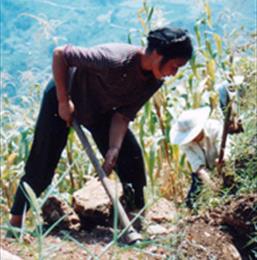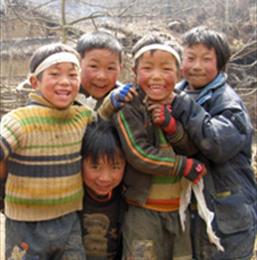May 1999
31st May 1999
DORS Office Move
Our new postal address in China is: 625300 Sichuan Province, Hanyuan County, Gongxiao She 2 Hao Lou, 1 Danyuan 6 Lou 1 Hao. The address is effective from now, although letters to the former address will still get to us. We have found a larger place to accommodate the new volunteers.
DORS Volunteers
Many people responded to our request for a project assistant, one has been invited to join us, and will be starting in July. We are still seeking a second volunteer, with community forestry experience; to help with forestry related projects. We would like to thank all the applicants for their interest in DORS and willingness to give up their time and expertise to help with the village projects in Hanyuan. We are sorry that we are not in a position to take on more volunteers at present.
New Water Supply Project Begins in Chenhe Village Hamlet 2
Last month we reported on the successful completion of the second drinking water supply project in Chenhe Village. One further hamlet in the village is still without clean drinking water, Hamlet No. 2. After request for support from the village, DORS decided to assist with this supply. The survey was carried out by DORS with assistance from the villagers, and the plan for the supply was designed by DORS with assistance from the Water Conservancy Bureau. The tank site, water source and piping routes were chosen by the villagers. People were enthusiastic about starting the project as soon as possible and preliminary work had begun on the tank before the plans were finalised. The villagers are hoping to complete most of the project before the rice-transplanting season later this month. An agreement was signed between DORS and the hamlet leader. Total funding for the water supply is 15,600 RMB (GBP1,155). All 146 people in the hamlet will have access to the clean supply.
Rural Credit Repayments
The last month has been time for repayments of rural credit from all four of the villages where DORS have implemented the Women's Rural Credit Scheme. In two of the villages repayment rates have been lower than previously, although the collection period is not yet over. The reasons for delayed repayments are explained by the women as due to the time of year i.e. that it is a long time since the harvest and they have few agricultural goods to sell. It is also a time of high outgoings such as for the purchase of seed and fertiliser. Many were relying on the sale of pigs for repaying the loan, but the live pig price is at a nation-wide low. Therefore they prefer to wait until the price recovers. A third reason given is that now is an agricultural busy period, transplanting of rice seedlings, and planting of maize and beans. However, in Na'er Village all the loan repayments were made in full. Their repayments were designed to have a smaller repayment after the first six months when there is less cash available (the repayment just made), and a larger repayment after 12 months. This seems to be working well so far.


